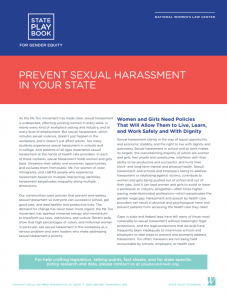Abortion rights, women of color, and LGBTQI+ people are under attack. Pledge to join us in fighting for gender justice.
As the Me Too movement has made clear, sexual harassment is widespread, affecting working women in every state, in nearly every kind of workplace setting and industry, and at every level of employment. But sexual harassment, which includes sexual violence, doesn’t just happen in the workplace, and it doesn’t just affect adults. Too many students experience sexual harassment in schools and in college. And patients of all ages experience sexual harassment at the hands of health care providers. In each of these contexts, sexual harassment holds women and girls back, threatens their safety and economic opportunities, and excludes them from public life. For women of color, immigrants, and LGBTQ people who experience harassment based on multiple intersecting identities, harassment perpetuates inequality along multiple dimensions.
Our communities want policies that prevent and redress sexual harassment so everyone can succeed in school, get good jobs, and lead healthy and productive lives. The demand for change has never been more urgent; the Me Too movement has sparked immense energy and momentum to transform our laws, institutions, and culture. Recent polls show that high percentages of voters, and millennial women in particular, see sexual harassment in the workplace as a serious problem and want leaders who make addressing sexual harassment a priority.


